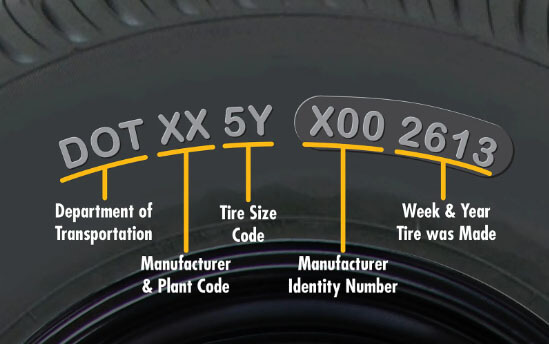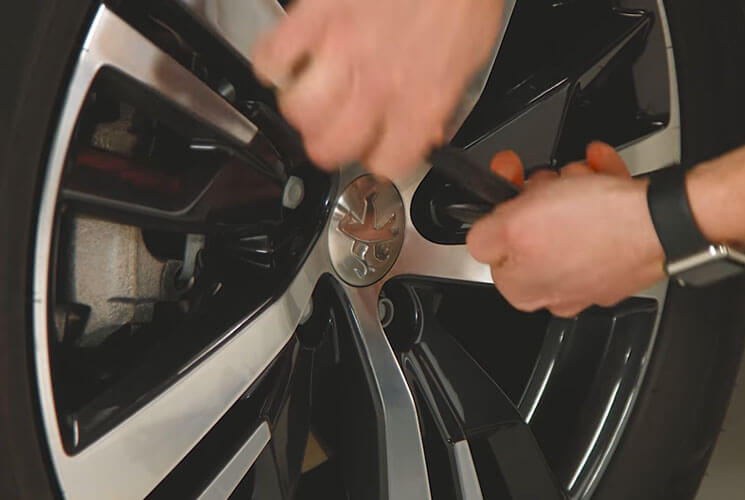While driving, if you feel like your car is not pulling as it used to or is vibrating more than usual, the tires can be to blame for it.
Tires do tend to get worn down as time passes by. So, an important question arises; how long do tires last on a car?
The longevity of tires depends on many factors, but generally, under correct conditions, tires should last between 60,000-75,000 miles or 5 years. Factors like your driving style and weather conditions also play a huge role in this.
Hence, if you are wondering whether your car tires need replacement or you wanna know how to increase the lifespan of your tires, you are in the correct place.
Keep on reading to learn more.
How Long Do Tires Last On A Car?

How long a tire will last on a car depends on many different factors, including driving conditions, tire types, and many more.
Each tire’s lifespan can vary based on its construction and a variety of wear-and-tear conditions, but suppliers and manufacturers recommend basic mileage caps to assist against using unsuitable tires.
However, following the proper maintenance rules, good quality tires can easily last between 60,000-75,000 miles or 3-5 years.
But some tire companies come with 80,000 miles warranty, so you can stay assured these tires will last for at least 80,000 miles.
On average, most tire companies guarantee a lifespan between 30,000-50,000 miles.
A high-performance summer tire made to cling to the pavement for optimal grip might only have a 14,000-mile tread life.
Yet, an all-season tire made to provide years of dependable travel may last up to 80,000 miles.
70,000 miles or more may be easily achieved with family-car tires, according to a new analysis of 8 all-season and 18 performance all-season types. Several all-season tires for light trucks and SUVs have a longer lifespan.
Generally, ultra-high-performing tires deteriorate faster. In reality, some UHP tires examined in western Texas had wear patterns that suggested they would only go 25,000–30,000 miles before needing replacement.
What Are The Factors That Affect The Lifespan Of Tires?

As we mentioned earlier, the lifespan of a car tire cannot be directly estimated, and many factors play an important role in this.
To accurately determine the lifespan of your tires, it’s essential to consider various factors. Continue reading to learn more about these factors.
Weather Conditions
Weather is one of the key factors that play a role in the lifespan of a tire. Tires can wear out more quickly while driving in bad weather like rainfall, snow, and ice, as they have to work more to retain a better grip.
Tire life is also shortened by sunshine exposure and higher temperatures. Therefore, tires in hotter climates often need to be replaced more frequently.
Additionally, depending on the weather conditions, lower pressure will result in lower pressure in the tires. In comparison, a higher pressure will result in higher pressure in the tires.
Usually, higher pressure in tires can result in shape distortion of the tire, which will cause decreased traction and quicker wear and tear.
On the other hand, lower tire pressure can reduce tire endurance leading to punctures and damage.
Improper Driving
Another key factor that can reduce the lifespan of tires is improper driving practices. If you drive your car recklessly, then it is simply common sense that the tires will age faster.
Moreover, the strain on tires will be significantly increased if you repeatedly expose your car to aggressive acceleration, high loads, and abrupt stopping.
Also, the tires will take a great hit when you’re driving aggressively over potholes, speed bumps, and harsh roads.
How Long Do You Drive Your Car?

The lifespan of your car also depends on how long you are driving your vehicle, which means how frequently you drive your car.
So, tires will wear down more as you drive your car. As the tires wear out, the treads start to get damaged more, eventually losing their traction, reducing their lifespan.
Tire Manufacturer
There are over 12 tire manufacturing companies under the U.S Tire Manufacturers Association (USTMA), and all over the world, there are over 1000’s companies.
These companies make a huge variety of tires, available at different prices and indicated for different types of cars.
You will find tires from some manufacturers which come with a guarantee of 70-80k miles, whereas others may come with a mileage guarantee of between 30-50k miles.
So, depending on what type of tire you use from which manufacturer will play a huge role in determining the lifespan of the tire.
How To Understand When To Replace Tires?

As you know by now, predicting the overall lifespan of your car tire is not easy. However, finding out when to replace tires is pretty much easier than predicting the lifespan.
These factors below will help you determine when you need to replace the tire.
1. Low-depth tread
The tire’s tread is the material that meets the ground. Usually, the tread depth of fresh tires is between 10/32 and 11/32 inches. When you drive more and more, your miles increase, and your tread depth decreases with time.
According to NHTSA, when the tread depth gets down to 2/32 inches, you cannot use the tires anymore, and you must replace them.
Detecting tread depth is not that difficult, and any driver can see them when physically observing the tires. There is an easy penny test that you can use to check the tread depth.
All you will need is a penny for the test. The top of the figurehead’s head should be towards the tire as you insert the penny into the channel.
You have a sufficient quantity of tread left on the tire if any of the treads is hiding the figurehead. The time has come for replacement tires if the whole figurehead is visible.
2. Check for bulges and cracks
Another easy way to detect damaged tires is to check for any bulges, blisters, or cracks in the surface of the tires.
As the tire ages, it starts to wear down, causing these cracks and blisters on the tire. All these symptoms are clear indications that tires need replacement.
3. Rough driving experience
If you notice any unwanted vibrations or increasing tire noise while driving your car, the tires might have an issue. It usually happens when the tires are unbalanced or have a structural problem within them.
So, this is also a sign of damaged tires, so you should get it checked by a professional asap.
How To Increase The Lifespan Of Tires?
Just like other components of your car, the tires also need to be serviced on a regular basis to increase the lifespan of your car tires.
So, follow these tips below to get the best out of your new tires.
Check the tire pressure
Checking the tire pressure is another easy technique to detect whether or not the tires need replacement.
Every tire manufacturer has a fixed set of recommended tire pressure which you can find in the manufacturer’s manual.
You should buy a handheld tire pressure gauze which is really cheap but a handy pressure measuring gadget. Simply measure the tire pressure every month.
If you notice that the pressure doesn’t stay constant, then you should check the tires for any damages, cracks, or for other issues.
Rotate the tires
Rotating the tires is also important to make sure that the tires are wearing uniformly from all sides.
It is recommended to rotate your car’s tires every 5000-8000 miles as this will also increase the lifespan of the tires.
Balance the tires
A tune-up for all of your wheel-tire combinations is tire balancing. Balancing ensures that weight is uniformly dispersed over the tire and wheel’s whole diameter.
Related: The Difference Between Wheels And Rims [3 Major Reasons]
So, you must balance the tires if you experience an abnormal tremor or bounce while driving. Maintaining balance can stop unusual wear patterns in your tires.
Conclusion
It can be extremely tricky to predict the tires’ lifespan as it depends on many factors. Driving with a worn-out tire is severely risky and leads to more serious accidents.
Thus, it is important to properly know how to understand the lifespan of the tires. Along with that, you should also maintain your tires on a regular basis to increase the lifespans of your tires.
If you are unsure whether or not your tire needs replacement, you should consult a professional mechanic to check the tires for you.
Additionally, always buy good quality tires and do not settle for lower quality to save money.
Related: How Do Nails Get In Tires – Can You Fix It?
FAQ
Below, we will answer all the FAQs related to the tires’ lifespan. This section will further clarify all our confusion regarding today’s discussion.
How often you should replace your car tire depends on what type of tires you are using and from which manufacturer. Usually, some manufacturers recommend replacing tires after 5-6 years, whereas other manufacturers suggest replacing the tires between 6-10 years.
The average cost of replacing a set of four tires can be anywhere between $460-$1280. However, the cost can be even more than this, and it heavily depends on what type of tires you are getting, along with their sizes. The intended use will also affect the price of the tires.
Yes, it is possible to extend the lifespan of tires by following a few techniques. They can last longer than their anticipated lifespan if they are maintained properly by things like maintaining the air pressure often, rotating the tires, and preventing extreme driving conditions.
No, driving with a low tread depth can be extremely dangerous. A tire has no traction with a tread depth of less than a few millimeters (2/32 inches). Car handling and stopping distance are compromised when the tread depth is too low.
